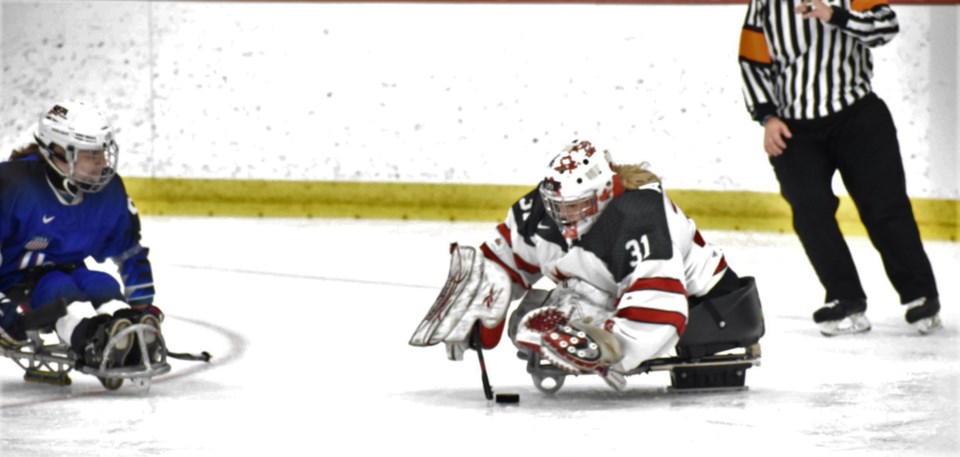YORKTON - When the inaugural Para Ice Hockey Women's World Challenge was held recently in Green Bay, Wisc. it was an historic moment for the sport, and for Saskatoon’s Tracey Arnold who guarded the Canadian net.
“It was emotional. A lot of people have been working towards this for quite a few years,” offered Arnold in an interview with Yorkton This Week.
The United States won gold at the four-team World Challenge with a 5-1 win over Canada in Sunday's final. The tournament also featured Britain and a Team World comprised of athletes from different countries.
The event is one Arnold said was about more than a gold medal.
It is hoped the tournament, hosted by World Para Ice Hockey, is a stepping stone to inclusion in the Paralympics, where men's Para hockey has been a part of the program since 1994.
The next step would be a world para ice hockey championship for women, said Arnold, adding they hope that happens as soon as 2025, and then to be added to the Paralympics in 2030.
“But one of the first steps had to happen,” said Arnold, adding they were encouraged by the interest.
“By the time we’d finished the event so many more girls and women had reached out to be involved.”
As for the final game, it was the usual battle expected on the ice between Canada and the United States.
“There was a high level of emotion, a high level of rivalry – a few scrums and few big hits,” said Arnold.
But while a gold medal against the Americans would have been great, Arnold said players recognized there was a much bigger story having a sort of ‘first chapter’ at the event.
There is more to wearing the Team Canada jersey than winning or losing at this point. There is an entire sport to grow into something bigger than it currently is.
Part of the team’s responsibility is helping pave the way for the future.
“Being part of the team we understand that,” said, adding that growth includes at home too. “We are growing the sport in Saskatchewan too.
“It’s part of my journey provincially and nationally.”
For Arnold, being involved in para hockey really is taking her back to a first love.
“I played stand up hockey. Hockey has been part of my entire life,” she said.
Arnold played the game as a young girl before a car accident that killed her father and left her partially paralyzed at the age of 12.
For a time after the accident Arnold said she turned to arm wrestling as an athletic endeavour, becoming a top level performer, but about seven years ago felt a need for a change, and she found her way back to the ice.
“The first season I played defence,” said the now 44-year-old mom, but then she took a turn in the cage. “. . . The first time out I really enjoyed it . . . I really enjoy the challenge of it, being constantly in the game, the challenge of it mentally and physically . . .There’s always something to learn.”
While continuing to learn the game, Arnold plays on a local mixed team in Saskatoon, a mixed provincial team, and with the national women’s team.
It’s a big commitment for Arnold who works for the Saskatchewan Health Authority, and has a young son who started Kindergarten just days after the gold medal game in Wisconsin, two monumental events in different aspects of her life.
Even at the national level it’s not a case of getting a cheque to play, and that in itself is another barrier the sport needs to get through.
“A lot of it comes down to awareness and funding,” said Arnold.
The more women who know the sport exists for them, the more players, and that is the awareness side.
Finding dollars is more difficult.
While Canada's men's Para team operates under the Hockey Canada umbrella, the women's program is self-funded. The players paid their way to a training camp last year to prepare for the World Challenge tournament.
Arnold said she is fortunate to have both a supportive family and support at work too, but some added dollars would still be welcome for the broader growth of the program.
But, until the dollars do start to flow the program’s way, Arnold said the players will continue to promote and play, adding they can see things improving already.
“There are a lot of young girls we’re really proud of,” she said.

